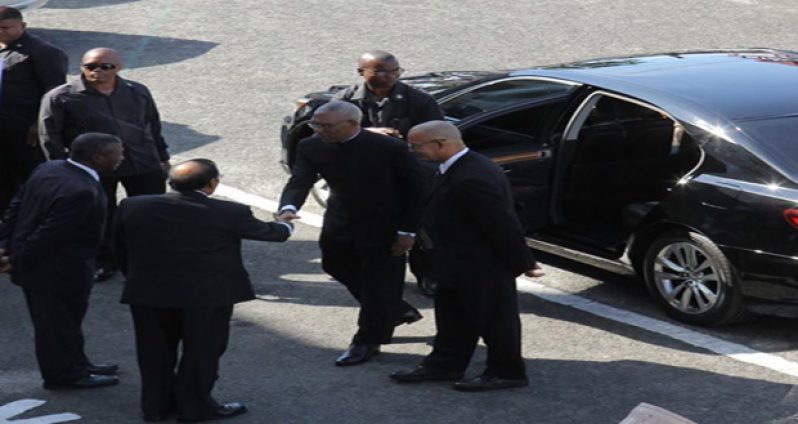REITERATING that Guyana will continue to be a peaceful nation, President David Granger has declared that Guyana’s “border takes first place”, and that the country is more than willing to settle the territorial controversies with Suriname and Venezuela through the judicial process.In his third address to the Parliament since assuming the presidency some six months ago, the Guyanese Head-of-State told parliamentarians from both sides of the aisle, diplomats and senior public servants that with regards to Venezuela, a judicial settlement will be consistent with the spirit of the Geneva Agreement.
Following ExxonMobil’s discovery of oil in the Liza-1 well in the Stabroek Block, approximately 120 miles offshore Guyana, Venezuela has expanded its claim to include Guyana’s Atlantic front. This new area claimed by Venezuela includes Guyana’s Exclusive Economic Zone (EEZ), and also intrudes on the EEZ of Suriname, French Guiana, Barbados and a chain of other Caribbean islands. ExxonMobil is a U.S.-based oil and gas company.
Venezuela’s latest claim came in the form of decrees by that country’s President, Nicolas Maduro. The first decree claimed the waters that include the area where Exxon is drilling, in addition to the earlier claim of the Essequibo, which is two-thirds of Guyana’s land mass.
The second decree, which replaced the first, does not specify any coordinates in relation to boundaries, but makes clear that Venezuela is ready to use military force to defend its new maritime boundary. Guyana has condemned both decrees, contending that the claim by Venezuela to this country’s EEZ has no basis in international law, pointing out that the 1899 Tribunal Award had put to rest that country’s claim to the Essequibo.
Guyana’s pursuit of peace had led to the signing, together with Britain and Venezuela, of the Geneva Agreement in February 1966, three months before gaining Independence.
The agreement required both Guyana and Venezuela, in the event of disagreement over resolving the controversy between themselves, to refer the matter to the United Nations (UN) Secretary General, who was mandated to choose one of the means for the “pacific settlement of disputes” stipulated in Chapter VI of the Charter of the United Nations.
The UN Secretary General selected the ‘Good Offices Process’ as one of the pacific means available under the Charter. “Guyana’s assessment now is that, after 25 years, the ‘Good Offices Process’ has been exhausted. It is, therefore, not an infraction, but a fulfilment, of the Geneva Agreement to seek another peaceful option if one tried option failed to resolve the controversy,” President Granger said.
FAILED PROCESS
He said Guyana, in its engagements with the UN Secretary General, with the teams that he has dispatched to Georgetown and in its meetings with leaders at the international level, emphasised that the ‘Good Offices Process’ failed to resolve the controversy.
Mr Granger stressed that the time has come for another peaceful option to be pursued, and Guyana favours a juridical settlement through recourse to the International Court of Justice.
“Guyana’s decision to select another one of the options available under the Geneva Agreement, therefore, was wholly consistent with its object and spirit. The recourse to a juridical process as a final and binding means of resolving the controversy is provided for by the provisions of the Geneva Agreement. Guyana has done nothing which can be regarded as being in breach of the Geneva Agreement,” the President noted.
He said Guyana remains committed to dialogue with Venezuela although its experience with dialogue on territorial-related issues never yielded encouraging results.
“The chronicle of Venezuela’s provocations and aggression towards Guyana since Independence is well known. Through unsubtle threats and undiplomatic coercion, Venezuela has sought to establish itself as the arbiter of Guyana’s development of the entire Essequibo that it still refers to as its zona en reclamación. Venezuela’s claims are not only illegal. They are injurious to the economic development of Guyana.”
HINDRANCE
President Granger emphasised that Venezuela must desist from hindering Guyana’s economic development in an obtrusive and obstructive manner that is tantamount to interference in its internal affairs.
He said that the neighbouring country must desist from threatening investors who have a legitimate right to pursue their activities in local territory.
By Tajeram Mohabir



.jpg)









